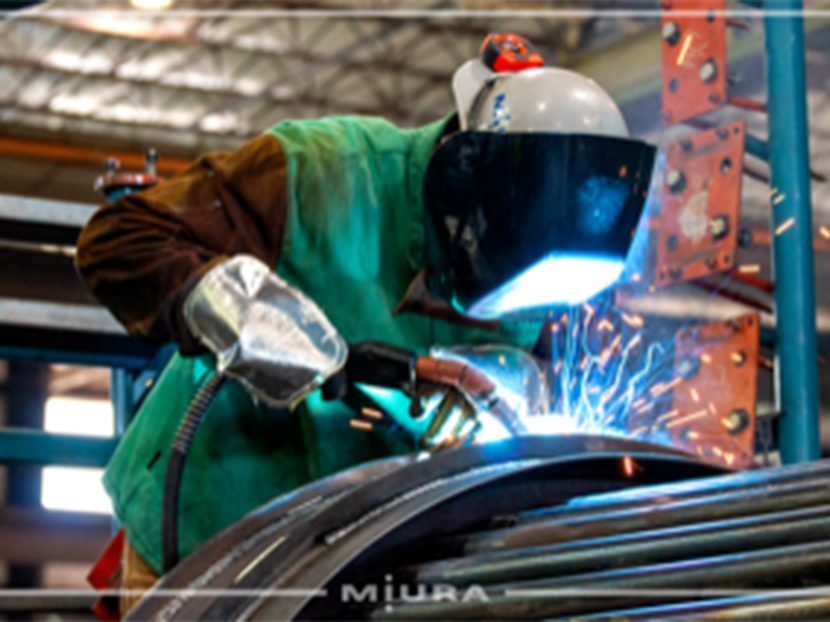OSHA Recognizes Miura Boilers "Culture of Safety"

Over the past 60 years since it began manufacturing process steam boilers in 1959, Miura’s corporate philosophy has placed an emphasis on safety, both in the performance of its products and the workplace environment in which they are designed, engineered, assembled, and shipped.
The results of Miura’s efforts have been extraordinary with a best-in-industry steam boiler safety record that represents a monumental achievement: With more than 140,000 units in operation worldwide, Miura has never had a pressure vessel explosion resulting in casualty. The company’s “safer-by-design” engineering, combined with its unique boiler geometry, means that catastrophic vessel failure is practically impossible, and day-to-day safety issues related to installation, operation and maintenance are greatly minimized.
But being the safety leader didn’t stop with product performance, and shortly after opening its U.S. manufacturing facility in Rockmart, Georgia, in 2009, Miura set out to achieve the distinction of becoming the safest workplace in the steam boiler industry. Earning the OSHA Safety & Health Achievement Recognition Program (SHARP) certification was another step in that direction.
“Miura has put safety first in everything we do,” stated Carrie Murakami, the general affairs lead at Miura America, who worked with Robert Hendry and Paige Rohrig of Georgia Tech where the OSHA Safety & Health Consultation Program is administered for the state of Georgia.
The SHARP designation is awarded to those businesses that have used OSHA's On-Site Consultation Program services and operate exemplary safety and health programs. SHARP recognizes companies with fewer than 250 employees at the site (and fewer than 500 U.S. employees) that enter this elective program and achieve an outstanding injury and illness prevention rating. A SHARP designation requires complete dedication from all areas of a company and all levels of employees, as well as an investment in the necessary resources.
As Rohrig explained it, “SHARP certification can take years to achieve, and requires a substantial commitment in time and resources. It’s not just about putting safety guards in place, or doing noise sampling. Instead, it requires a whole system, a whole culture of safety from the newest employee to the president or CEO of the company.”
Earning its SHARP designation required that Miura go through an exhaustive review of procedures and process, while having all employees participate in weeks of safety training performed at the beginning of the workday, with a new monthly topic introduced to all employees, including office staff.
Each department within Miura also held five-minute Safety Huddles at the beginning of the shift and upon returning from lunch. Each member of the department was responsible for addressing a certain topic for each meeting. These huddles met each workday to get the employee’s mind on practicing safe work habits.
“Going through the SHARP certification process helped to make Miura an even safer company, since it allowed us to identify critical areas that required additional solutions,” stated Murakami. “In one instance, we addressed a concern by investing in fifteen new welding hoods. It was a small price to pay for keeping our welders safe, and a great investment considering that it helped to reduce related injuries. Investing in safety and health measures is always worth it.”
Throughout her involvement with the program, Mr. Rohrig has recognized that “A company’s commitment to workplace safety and health is completely tied into the production and quality of their products, because many of the same preventative maintenance and inspection protocols are used throughout. The mindset of constantly working to achieve maximum safety is apparent in everything they do.”
Companies that earn the OSHA SHARP designation must also have injury and illness rates below the national average, an achievement that also speaks to the needs of Miura’s customers who understand how injuries and the resulting downtime can adversely affect productivity, while increasing insurance costs and worker’s compensation claims.
By achieving its SHARP designation, and its latest renewal, Miura continues to build its reputation as a safety leader in the steam boiler industry, as well as a standout company in the state in which it manufactures its products.
“Currently, there are nine SHARP designated companies in Georgia,” stated Rohrig. “That small number should provide a basis for understanding just how difficult it is to qualify for this certification. It takes a lot of effort and a special kind of company to do that.”
SHARP status puts Miura in an elite group of small businesses that maintain exemplary safety and health programs. In addition to being granted an exemption from OSHA programmed inspections for up to two years, and subsequent renewal for up to three years, a SHARP certification speaks to the culture of a company, whose goal is to protect workers from all safety and health hazards that may exist at the workplace prior to completing the program, while constantly striving to always be better.
Achieving SHARP certification connects well with Miura’s corporate philosophy, which has always put safety first, while enhancing the efficiency and reliability of the workplace. Miura employees also appreciate the unusual level of commitment the company provides in addressing their individual safety and health needs.
“Providing a safe and healthy workplace for workers is simply good business, since it often helps build employee appreciation and loyalty,” added Murakami. “SHARP designation is also a real advantage in attracting new employees who value the commitment a company makes on their behalf. If you have employees that are safe, then the moral is better. If you care more about them, they typically care more about you.”




